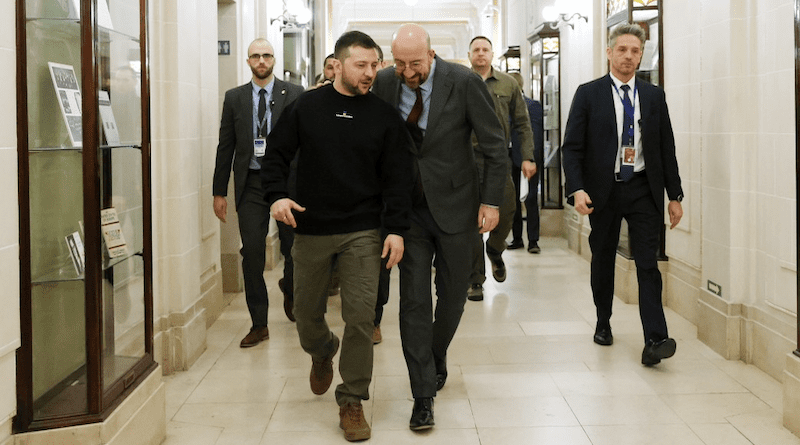Zelenskyy Hailed By EU Leaders, Hears Promises On Fighter Jets, But Not Accession
By EurActiv
By Alexandra Brzozowski
(EurActiv) — Ukraine’s President Volodymyr Zelenskyy received a hero’s welcome in Brussels on Thursday (9 February) as he lobbied EU leaders to expedite the delivery of modern weapons to halt Russia’s upcoming spring offensive.
After Wednesday’s visits to London and Paris to lobby Britain, France and Germany for fighter jets and long-range missiles, Zelenskyy joined EU leaders as the special guest at their regular summit, invited by European Council President Charles Michel.
Addressing EU leaders, Zelenskyy called warned them that Ukraine needs to receive artillery, munitions, modern tanks, long-range missiles and fighter jets “faster than the aggressor” can prepare for what he said would be a dangerous new spring offensive.
“We are talking about aggression not just against Ukraine, but against Europe,” he said.
“I am grateful to all of you who are helping, grateful to everyone who understands how much Ukraine right now needs these possibilities,” Zelenskyy added.
He also called for tighter sanctions on Moscow, namely to sanction Rosatom, and punishment for Russian leaders responsible for the invasion.
“Free Europe cannot be imagined without a free Ukraine,” he told the leaders.
Speaking later to reporters alongside European Council President Charles Michel and European Commission President Ursula von der Leyen, Zelenskyy said it was in the interest not only of Ukraine but also for the whole of the EU “that Russia must not make new missiles, not attack our cities”.
Zelenskyy called on the EU to target drones, Russia’s military industry and the IT sector. Von der Leyen confirmed the next, tenth sanctions package was expected around the one-year anniversary of Russia’s invasion, on 24 February.
“The next weeks and the next months will probably be decisive. It’s not the moment to tremble, but to deploy full support,” Michel told reporters after the meeting.
Fighter jets coming?
Speaking after the meeting, Zelenskyy said he had heard from several EU leaders they were ready to provide Kyiv with fighter jets to help fight against Russia’s invasion, without giving further details on the pledges.
Though member states did not immediately confirm his statements, Zelenskyy’s remarks could indicate one of the biggest shifts yet in Western military support for Ukraine.
Western countries that have provided Ukraine with arms have so far refused to send warplanes or long-range weapons capable of striking deep inside Russia.
“Europe will be with us until our victory. I’ve heard it from a number of European leaders […] about the readiness to give us the necessary weapons and support, including the aircraft,” the president told reporters in Brussels.
“I have a number of bilaterals now, we are going to raise the issue of the fighter jets and other aircraft,” he said.
EU leaders were expected to meet with the Ukrainian president in small groups of member states, mindful of keeping a tight schedule, with Zelenskyy expected to make another push to allies for sending fighter gets to Ukraine.
“For us to survive, we need the weapons, we need these weapons, we need financial funds. We are defending our common values […] and I hope that you understand when you help Ukraine, you are helping yourselves,” Zelenskyy said ahead of those talks.
A senior aide to Ukrainian President Volodymyr Zelenskyy said on Thursday as the president held talks in Brussels on Kyiv’s request for more weapons to fight Russian forces, the question of fighter jets had been resolved.
“The question of long-range weaponry and fighter jets for Ukraine has been resolved,” Andriy Yermak, chief of the presidential staff, wrote on the Telegram messaging app.
“Details still to follow,” he added.
But the split between EU member states remains, how quickly and how far the supply of weapons should go.
“It’s very important that we speed up military aid to Ukraine. I think all of us looked in the warehouses at what we have. But we should do more,” Estonian Prime Minister Kaja Kallas said.
Meanwhile, Dutch Prime Minister Mark Rutte urged Ukraine’s allies needed to ensure they are not getting themselves into a direct confrontation with Russia.
“You have to make absolutely sure you are not getting into an Article 5 direct confrontation between NATO and Russia,” he said, adding that the pros and cons of such decisions should only be discussed behind closed doors.
The Kremlin, meanwhile, reacted with a warning to the new announcements.
“We see this as a growing engagement of Germany, UK, France in the conflict between Russia and Ukraine. The boundary between indirect and direct engagement is gradually disappearing. We can only regret it,” Kremlin spokesman Dmitry Peskov said in Moscow.
“The actions of these countries lead to an escalation of tensions […] make this conflict more painful… and these actions will not change the objectives of our country within the framework of the special military operation,” Peskov added.
‘This year, 2023’
On the issue of Ukraine’s EU membership bid, Zelenskyy said he hopes they can start opening “the dialogue about our future within the EU” this year, not least because it is a way of motivating the Ukraine’s fighting armed forces.
Pressed by reporters on the matter, he turned to Michel, speaking in English: “When I say this year, Charles, I mean this year, 2-0-2-3,” he said, prompting laughter in the press room.
Just like last week in Kyiv, Von der Leyen refused to be drawn into discussing timelines for when Ukraine could start negotiations on EU accession.
“There is no rigid timeline. It’s a merit-based process,” she said.
The European Commission is set to release its assessment of Ukraine’s progress later this year, with an oral presentation of the EU executive’s seven reform recommendations expected in spring and the formal enlargement package in autumn.
“On the issue of accession Zelenskyy was more explicit in his press conference than behind closed doors,” an EU official told reporters said afterwards.

